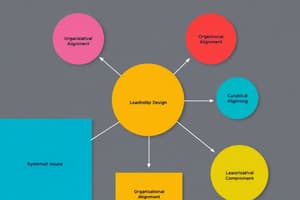Podcast
Questions and Answers
What is one of the major objectives of teaching Principles of Management?
What is one of the major objectives of teaching Principles of Management?
- To present management concepts with an emphasis on their future application. (correct)
- To focus exclusively on historical theories.
- To only develop skills for managing subordinates.
- To ignore personal goal-setting in management.
Which of the following topics is NOT mentioned as part of the organizational structure?
Which of the following topics is NOT mentioned as part of the organizational structure?
- Span of Command
- Behavioral Models (correct)
- Centralization vs. Decentralization
- Job Design
What concept is linked to understanding Group Dynamics in Organizations?
What concept is linked to understanding Group Dynamics in Organizations?
- Job Specialization
- Organizational Performance
- Communication Networks
- Team Effectiveness (correct)
What aspect of leadership is emphasized in the objectives of Principles of Management?
What aspect of leadership is emphasized in the objectives of Principles of Management?
Which of the following leadership theories is specifically associated with motivation?
Which of the following leadership theories is specifically associated with motivation?
What is the primary responsibility of first-line managers?
What is the primary responsibility of first-line managers?
Which title is typically associated with middle managers?
Which title is typically associated with middle managers?
What trend is influencing the structure of middle management in organizations?
What trend is influencing the structure of middle management in organizations?
How do first-line managers typically interact with internal human relations?
How do first-line managers typically interact with internal human relations?
What is a key responsibility of middle managers in organizations?
What is a key responsibility of middle managers in organizations?
Flashcards are hidden until you start studying
Study Notes
Historical Overview of Management
- Management history and theory present essential concepts for long-term application.
- Emphasizes the relevance of management training for personal and professional goal-setting.
- Encourages students to confront management challenges, including self-management.
Managerial Levels and Skills
- Top Managers: Highest authority, responsible for overall management and strategic direction.
- Middle Managers: Supervise first-line managers, implement organizational plans, and coordinate departments.
- First-Line Managers: Lowest level of authority, directly manage non-managerial employees involved in production.
- Roles of first-line managers evolving to focus on teamwork, technology, and internal human relations.
- Overall management layers are reducing as organizational hierarchies flatten.
Future Trends Impacting Managerial Work
- Managers must adapt to economic shifts, changing consumer preferences, and rapid technological advancements.
- Increasing diversity in the workforce necessitates effective management to leverage varied employee contributions.
- Firms face global competition, requiring greater knowledge of international business practices.
- Quality management has gained importance, focusing on continuous improvement due to competitive pressures.
Classical View of Management
- Divided into scientific management, bureaucratic management, and administrative management.
- Scientific Management: Developed by Frederick W. Taylor, focused on defining the most efficient ways to perform tasks.
- Taylor's principles aimed to enhance productivity and efficiency, achieving notable increases in output.
- His experimentation at Bethlehem Steel showcased the direct impact of scientific method on productivity.
Contributions of Early Organizational Behavior Advocates
- Robert Owen: Promoted ideal workplace conditions; focused on worker rights and community involvement.
- Hugo Munsterberg: Founded industrial psychology to enhance productivity by understanding individual behavior at work.
- Mary Parker Follett: Advocated for collective organization structures to maximize individual potential.
- Chester Barnard: Conceptualized organizations as social systems needing cooperation among individuals.
Hawthorne Studies
- Conducted at Western Electric (1924-1930), analyzed effects of lighting on worker productivity.
- Findings revealed that output increased with improved lighting for both experimental and control groups.
- Studies shifted focus towards human behavior in organizations, challenging the notion of employees as mere machines.
Impact of Globalization on Management
- Globalization influences managerial operations, requiring a broadened perspective on international business.
- Managers must navigate and adapt strategies for diverse markets and cultural contexts to remain competitive.
Studying That Suits You
Use AI to generate personalized quizzes and flashcards to suit your learning preferences.





